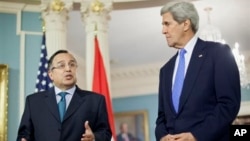U.S. Secretary of State John Kerry and his Egyptian counterpart, Nabil Fahmy, met in Washington Tuesday. They discussed an Egyptian court's decision Monday to sentence 683 supporters of the outlawed Muslim Brotherhood to death for their role in protests last year against the overthrow of former president Mohamed Morsi.
United Nations Secretary-General Ban Ki-moon voiced his alarm over the death sentences handed down by the Egyptian court. Amnesty International said the Egyptian judiciary risked becoming what it described as "just another part of the authorities' repressive machinery."
U.S. Secretary of State John Kerry, as he headed into a meeting with Egyptian Foreign Minister Nabil Fahmy, said Egypt is clearly going through a "very difficult transitional process" in the weeks leading up to next month's presidential election. The top American diplomat said Egypt's constitution is "a positive step forward," but called the mass death sentences a disturbing development.
"But even as these positive steps have been taken, we all know there have been disturbing decisions within the judicial process. The court system does have very serious challenges for all of us," said Kerry.
It is the second time a court in Minya, Egypt has handed down mass death sentences after very short judicial hearings, although most of the 529 sentences imposed in March have been commuted to life imprisonment.
Egypt's foreign minister said the country's courts are independent of the government, but "part of what Egypt is all about."
"I can't comment on the content of the decisions themselves, but I am confident that due process is allowed and that when due process is allowed, and that the legal system will ultimately end up with the proper decision in each of these cases. We will build a democracy based on the rule of law," said Fahmy.
One Middle Eastern affairs analyst, Robert Hazan of Metropolitan State University of Denver, said he is skeptical of the prospects for fairness. He called the sentences "a serious breach of basic fundamentals, principles of a reasonable judiciary process."
"We don't understand the rationale. We don't understand whether these are reasonable judgments," said Hazan.
The U.S. is considering further aid to Cairo; but, Hazan said that while the U.S. can condemn the sentences occurring inside one of its staunchest allies in the Middle East, it cannot let anything happen "that would push Egypt into anarchy and chaos."
United Nations Secretary-General Ban Ki-moon voiced his alarm over the death sentences handed down by the Egyptian court. Amnesty International said the Egyptian judiciary risked becoming what it described as "just another part of the authorities' repressive machinery."
U.S. Secretary of State John Kerry, as he headed into a meeting with Egyptian Foreign Minister Nabil Fahmy, said Egypt is clearly going through a "very difficult transitional process" in the weeks leading up to next month's presidential election. The top American diplomat said Egypt's constitution is "a positive step forward," but called the mass death sentences a disturbing development.
"But even as these positive steps have been taken, we all know there have been disturbing decisions within the judicial process. The court system does have very serious challenges for all of us," said Kerry.
It is the second time a court in Minya, Egypt has handed down mass death sentences after very short judicial hearings, although most of the 529 sentences imposed in March have been commuted to life imprisonment.
Egypt's foreign minister said the country's courts are independent of the government, but "part of what Egypt is all about."
"I can't comment on the content of the decisions themselves, but I am confident that due process is allowed and that when due process is allowed, and that the legal system will ultimately end up with the proper decision in each of these cases. We will build a democracy based on the rule of law," said Fahmy.
One Middle Eastern affairs analyst, Robert Hazan of Metropolitan State University of Denver, said he is skeptical of the prospects for fairness. He called the sentences "a serious breach of basic fundamentals, principles of a reasonable judiciary process."
"We don't understand the rationale. We don't understand whether these are reasonable judgments," said Hazan.
The U.S. is considering further aid to Cairo; but, Hazan said that while the U.S. can condemn the sentences occurring inside one of its staunchest allies in the Middle East, it cannot let anything happen "that would push Egypt into anarchy and chaos."











